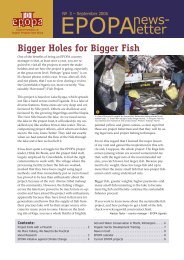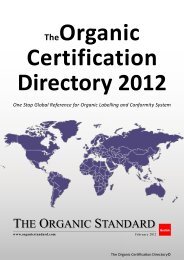PDF (50 kB) - Grolink
PDF (50 kB) - Grolink
PDF (50 kB) - Grolink
Create successful ePaper yourself
Turn your PDF publications into a flip-book with our unique Google optimized e-Paper software.
<strong>Grolink</strong><br />
Day 2<br />
Mr. John Njoroge chaired Day 2. In his remarks he urged participants to visit the<br />
exhibition hall where organic products were displayed from different countries.<br />
Participants were divided into 5 groups, which were to discuss different topics allocated<br />
to them. Each group was to get a facilitator, chair and reporter.<br />
On Standards and Certification the topics discussed were;<br />
1. Standards, General and Crop Production<br />
2. Standards, Animal Husbandry<br />
3. Functional and affordable organic certification<br />
4. Organizational formats and business strategies for certification bodies<br />
5. Preparation for National Working group discussion<br />
Group 1: Standards, General and Crop production<br />
Local standards and export standards<br />
Weaknesses of having two sets of standards<br />
− Use of local standards may reduce confidence of the consumers<br />
− In local standard document, only instructions are given, and no basis therefore less<br />
value/fewer details and lacks definitions<br />
− Local farmers may not be able to export their produce abroad<br />
− Local standards do not have consideration for social aspects<br />
− The local standards may bring about slow capacity building and so slow the Organic<br />
Agriculture competitiveness<br />
− By presenting two standards, means double work to the ones monitoring the system<br />
yet the consumer requirements are the same<br />
− And at the other hand, the export standards are drawn/too completed for local farmer<br />
to understand<br />
− Also the one for export is so much foreign oriented<br />
− Short standards don/t talk at animal husbandry/excludes<br />
− Emphasis in local standards is on production and not processing<br />
− Local standards not strict on usage of harmful substances<br />
Strengths of having two sets of standards<br />
− It’s convenient for a farmer to adopt the local standards because it’s less detailed<br />
− A one year conversion period in the local standards gives a quick access to the market<br />
by the producer and it’s a more realistic for our region<br />
− The local supplier gives allowance in case of unavoidable circumstances e.g. seeds<br />
− The two standards systems allow for gradual conversion<br />
− The two standards facilitate to meet the standards of both local and export markets<br />
− The export standard is well detailed and not easy to go astray for one intending to<br />
export<br />
EPOPA 3<br />
EAW, 1-3/12, 2004<br />
Export Promotion of Organic Products from Africa





